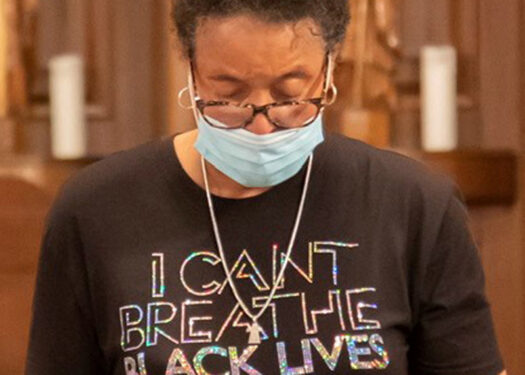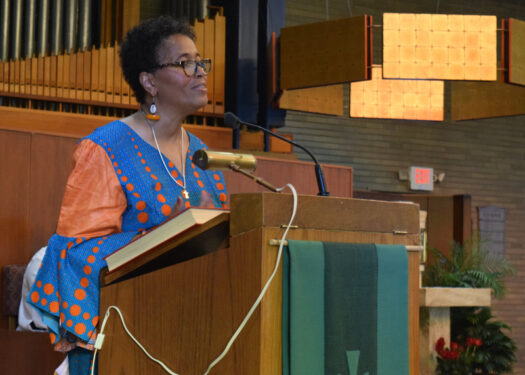By Rebecca Drake
SPRINGFIELD, Mass. (CNS) — The topic of racism can be a source of conflict. But when Sister Melinda Pellerin found herself in a conversation with a woman who denied the existence of systemic racism in the U.S., she let her faith lead her response.

“And so I had to come to the point where I can go many ways with this, but I’m going to go the way of Jesus,” she said. “I’m going to still look at this woman, as I try to look at everyone, as beloved, a child of God.”
Sister Pellerin, who professed her final vows as a Sister of St. Joseph of Springfield in 2019, was the first, and is still the only, African American sister in her congregation.
She was interviewed as part of a television series on Black Catholics produced by the Catholic Communications ministry of the Springfield Diocese. She currently is a pastoral minister at Holy Name Parish in Springfield.
In responding to the Gospel call to seek racial justice, Sister Pellerin said Catholics are well-equipped for the challenge.
“Think of Catholicism and what that word means,” she said. “We are family and if the members of our family are suffering, are in pain, or being persecuted, we are obligated to do something about it. And our obligation means to start an educational experience by teaching people about it.”
She said the first step in this educational experience is to do something that Jesus did very well: listen.
“But I want you to hear with your ears and with your heart, what this issue is all about,” she said to the interviewer, “and, as a white woman, you have not experienced it, but walk with me because I can tell you how I experience it.”
Like other Black Catholics interviewed for the series, Sister Pellerin’s roots are in Broussard, Louisiana, where the shadow of racism loomed over the most sacred moment of the Catholic liturgy: the reception of the Eucharist.
“And my grandmother and great-grandmother would tell me stories about, ‘Oh, and we went into church, Blacks had to sit in the back, and white Catholics sat in the front, and then Father would give Communion to the white Catholics first and then put on gloves and give Communion to us.”
But when Sister Pellerin asked her great-grandmother why she chose to remain in a segregated church, this was her answer: “And she said, ‘It’s not about where I sit in that church, it’s about looking up at that cross. And I have dedicated my life to Jesus and what Jesus wants to do. And I’m going to fight so that things will not always be this way.'”
Growing up as a Catholic at the former Holy Family Parish in Springfield, Sister Pellerin still wondered why her family was in “the white church” — until the Springfield Diocese ordained its first African American priest, Father Warren Savage, in 1979.
“And I really learned the history of my church, which is part of the Catholic Church,” she said. “Very few Catholics know the rich history we have contributed to the Catholic Church.”

But since becoming a Sister of St. Joseph, this former award-winning teacher has used her educational skills to share the history of Black Catholics, including working with the Federation of the Sisters of St. Joseph to create a “Juneteenth Calendar.”
“But we didn’t just do the fifteenth of June,” she said. “Every (day) in June I highlighted a different person from Africa who was a Christian in the early Catholic Church and African American Catholics.”
And while studying the history of Black Catholics reveals racism in the church, Sister Pellerin said Black Catholics can lead the way to healing and reconciliation.
“Black Catholics have dealt with this division in the church since Black Catholics started going to the church and I always say to myself, ‘We know how, with no way, we found a way.’ And so within this church, and within the segregation of the Catholic Church, our spirituality can come; we can celebrate that.”
Suggesting a way to begin the healing process, she cited the example of Springfield Bishop William D. Byrne, who soon after his December 2020 ordination and installation, held a Holy Hour and eucharistic adoration to pray for healing for clergy abuse victims.
“I loved the bishop when he got together and there was a prayer service over people who have been hurt by priests, and when he was in front of the Eucharist, I kept saying to myself, ‘We’ve got to do this for, not only those instances, but for racism in this country: Go before the Eucharist and pray about it.'”
It is the closeness to Christ in the Eucharist, she said, that has provided strength to Black Catholics who have faced discrimination both inside and outside the church.
“African American Catholics understand it through the racism and separation and Jim Crow: They still went into that church and sat in the back and received Communion, whether that priest put on a glove, it wasn’t about that glove,” she said. “It was about that, the Eucharist, the body of Christ. It’s what I will take inside of me and what I will take with me.”
Editor’s Note: A related video about Sister Pellerin can be viewed at https://www.youtube.com/watch?v=uJYwvM6hyq0.
Drake is editor/news director of the Catholic Communications ministry of the Diocese of Springfield.
